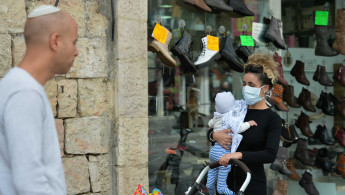Israel to use anti-terror tech to track 'invisible enemy' coronavirus, Netanyahu says
Israel's domestic security agency has denied the technology will be used to enforce quarantines.
2 min read
Israel has 200 confirmed Covid-19 cases [NurPhoto]
Israel plans to use counter-terrorism technology to counter the spread of the novel coronavirus, Prime Minister Benjamin Netanyahu said on Sunday.
Technology previously use to to "fight terrorism" will be deployed to track people who have been in contact with those who have contracted Covid-19, Netanyahu told a press conference in Jerusalem.
He described the novel coronavirus as an "invisible enemy" that must be located.
"In all my years as prime minister I have avoided using these means among the civilian public but there is no choice," Netanyahu said.
He added that he had requested permission from Israel's Justice Ministry as such measures could infringe on patient's privacy.
Israel's domestic security agency, the Shin Bet, confirmed it was looking into the use of its technology capabilities to fight coronavirus transmission, Reuters reported.
It is yet unclear exactly how technology will be use to prevent the virus' spread in Israel, where 200 Covid-19 cases have been confirmed and tens of thousands of residents are quarantined.
Netanyahu's announcement has prompted speculation that counter-terror technology could be used to enforce quarantine via infected persons' mobile phones.
Authorities could even backtrack through the phones' metadata to figure out where patients had been and who they had contacted, said Avner Pinchuk, a privacy expert with the Association for Civil Rights in Israel.
"I am troubled by this announcement. I understand that we are in unique circumstances, but this seems potentially like over-reach. Much will depend on how intrusive the new measures are," Pinchuk told Reuters.
The Shin Bet however has said that it do not plan to use technology for quarantine enforcement.
"There is no intention of using said technologies for enforcement or tracking in the context of isolation guidelines," it said.
On Sunday, Israel introduced a raft of new measures to counter the spread of the virus.
Malls, hotels, restaurants and theatres will be shut from Sunday onwards, and employees will be encouraged not to go their workplaces unless necessary.
The Israeli military said on Saturday it had ordered all soldiers back to their bases, telling combat soldiers that they should expect a lengthy stay with no leave for up to a month.
Last week, anyone entering the country was told to self-isolate for two weeks. Tens of thousands of Israeli residents are currently quarantined.
Schools have also been shut amid the pandemic.
Israel has 200 confirmed Covid-19 cases. Patients in good condition will be quarantined in four hotels in the north and south of the country starting on Monday, the health ministry said.
Follow us on Facebook, Twitter and Instagram to stay connected
Technology previously use to to "fight terrorism" will be deployed to track people who have been in contact with those who have contracted Covid-19, Netanyahu told a press conference in Jerusalem.
He described the novel coronavirus as an "invisible enemy" that must be located.
"In all my years as prime minister I have avoided using these means among the civilian public but there is no choice," Netanyahu said.
He added that he had requested permission from Israel's Justice Ministry as such measures could infringe on patient's privacy.
Israel's domestic security agency, the Shin Bet, confirmed it was looking into the use of its technology capabilities to fight coronavirus transmission, Reuters reported.
It is yet unclear exactly how technology will be use to prevent the virus' spread in Israel, where 200 Covid-19 cases have been confirmed and tens of thousands of residents are quarantined.
Netanyahu's announcement has prompted speculation that counter-terror technology could be used to enforce quarantine via infected persons' mobile phones.
Authorities could even backtrack through the phones' metadata to figure out where patients had been and who they had contacted, said Avner Pinchuk, a privacy expert with the Association for Civil Rights in Israel.
 |
| [Click to enlarge] |
"I am troubled by this announcement. I understand that we are in unique circumstances, but this seems potentially like over-reach. Much will depend on how intrusive the new measures are," Pinchuk told Reuters.
The Shin Bet however has said that it do not plan to use technology for quarantine enforcement.
"There is no intention of using said technologies for enforcement or tracking in the context of isolation guidelines," it said.
On Sunday, Israel introduced a raft of new measures to counter the spread of the virus.
Malls, hotels, restaurants and theatres will be shut from Sunday onwards, and employees will be encouraged not to go their workplaces unless necessary.
The Israeli military said on Saturday it had ordered all soldiers back to their bases, telling combat soldiers that they should expect a lengthy stay with no leave for up to a month.
Last week, anyone entering the country was told to self-isolate for two weeks. Tens of thousands of Israeli residents are currently quarantined.
Schools have also been shut amid the pandemic.
Israel has 200 confirmed Covid-19 cases. Patients in good condition will be quarantined in four hotels in the north and south of the country starting on Monday, the health ministry said.
Follow us on Facebook, Twitter and Instagram to stay connected





 Follow the Middle East's top stories in English at The New Arab on Google News
Follow the Middle East's top stories in English at The New Arab on Google News
![Israeli forces ordered bombed Gaza's Jabalia, ordering residents to leave [Getty]](/sites/default/files/styles/image_330x185/public/2176418030.jpeg?h=a5f2f23a&itok=_YGZaP1z)

